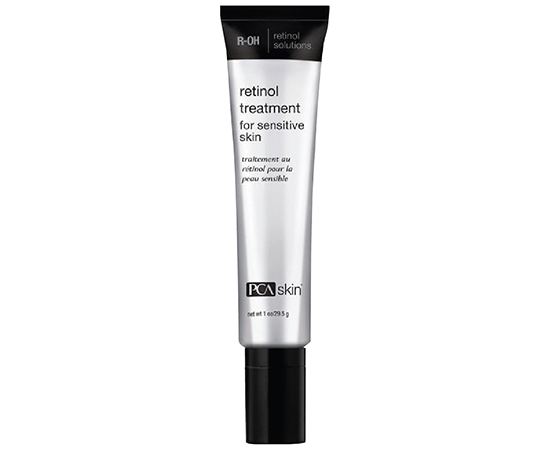Here’s What You Should Know About ‘Encapsulated Retinol’

At the top of the year, we featured a roundup of skincare ingredients that experts predicted were going to make a real splash in 2021. Among them were a few that you might have been able to guess, like CBD and niacinamide. One that really grabbed our attention was encapsulated retinol.
While many of you have prob heard of retinol already – the superhero anti-aging ingredient basically every derm swears by – the whole encapsulation technology might have been new to you. Today we’re breaking down the basics and shouting out some product picks to try yourself.
First, What’s Up with Retinol?
Long story short, retinol is a topical anti-aging ingredient that you can buy without a prescription. This vitamin A derivative has been studied long and hard over the decades, and tbh, it’s been proven to be a bit of a miracle worker.
“Retinol can be applied to the skin to help with certain conditions, including acne, clogged pores, fine lines, and discoloration,” says Dr. Scott Paviol, a board-certified dermatologist and founder of Paviol Dermatology in Charlotte, North Carolina. “It works by increasing skin cell turnover and building collagen, giving your skin a fresh, bright appearance.”
Ultimately, it improves the look and feel of your skin and is one of the only ingredients on the market with such a robust, truly impressive background of research that backs up its efficacy promises.
There’s a catch, though: retinol is known for being an aggressive product. Even if you don’t have particularly sensitive skin, you’re likely to deal with some redness, sensitivity, and peeling when you begin using retinol or when you increase the concentration. These are signs that the product’s working its magic, but it’s not very fun to deal with. Enter encapsulated retinol.
How is Encapsulated Retinol Different?
![]()
Traditional retinols are free form molecules of vitamin A. This can make them a bit unpredictable and it can lead to even more of those side effects we outlined above. Encapsulated retinol is basically a retinol molecule that’s wrapped up inside a carrier system.
“Encapsulated retinol is a technology that allows the active ingredients to penetrate deeper into the skin layer before being activated. It can be thought of as a time-release technology because it prolongs the time between the product hitting your skin and when it starts working,” explains Dr. Paviol. “This is different from traditional retinol because it causes less skin dryness, irritation, and flaking, which makes the product more tolerable.”
This technology also creates a more stable product with a prolonged shelf-life, adds Dr. Marie V. Hayag, a board-certified dermatologist serving NYC’s Upper East Side. She says, “The capsule protects the retinol and makes it less vulnerable to break down and increases the shelf life of the products that contain it.”
Why Do Some Products Have Both Traditional and Encapsulated Retinol?
Remember how we mentioned that encapsulated retinol penetrates to the deeper layers of your skin? Well, sometimes you want to address both the surface layers and the deep layers. A combo-deal allows you to enjoy both the time-release, deeper-penetrating benefits of encapsulated retinol along with the surface layer improvements generated by traditional retinol.
“However, start a combination product with caution because you may notice more skin dryness, irritation, and flaking, just like you would with traditional retinol,” notes Dr. Paviol. “I recommend that you start a retinol every third night and increase it to every night as tolerated. It is also a good idea to apply a moisturizer on top of your retinol to help cut down on dryness and irritation.”
Encapsulated Retinol Products to Slather
If you’re keen on trying an encapsulated retinol skincare product yourself, start with one of the below options.
Peter Thomas Roth Retinol Fusion PM Night Serum, $65

“This is a good night serum that contains microencapsulated retinol along with vitamins C and E,” says Dr. Hayag. “The vitamin C and E are potent antioxidants and protect your skin from damaging free radicals. Additionally, it contains squalene, which provides moisture, prevents transepidermal water loss, and leaves your skin feeling soft.”
PCA Retinol Treatment for Sensitive Skin, $111

Formulated specifically for sensitive skin types, this retinol treatment utilizes the brand’s OmniSome retinol delivery technology to encapsulate the retinol and deliver major results. Dr. Paviol says it’s one of his favorites on the market.
CeraVe Skin Renewing Retinol Serum, $19

Dr. Hayag often recommends this product to her patients. “I like this serum because it contains ingredients that help your skin maintain a healthy moisture barrier, like niacinamide and ceramides,” she says. “The hyaluronic acid in it also provides added hydration.”
Have you ever tried retinol? What about an encapsulated version? We’re eager to hear your thoughts. Let’s chat!
Disclaimer: Every product we review has been independently selected and tested without bias by our editorial team. We never take payment to review products, although some brands allow affiliate links, so we may earn a commission if you purchase a product by clicking on one of our links.





















Leave a comment